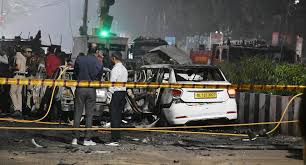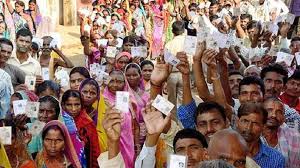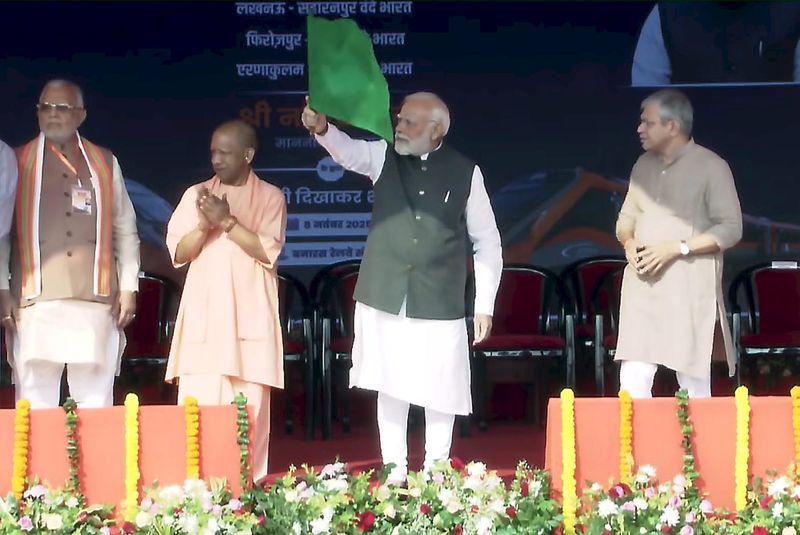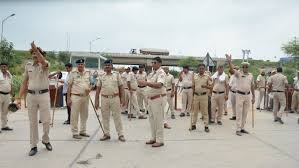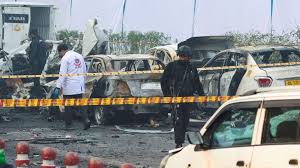Listen To This Post
Firozpur-Delhi Vande Bharat reduces travel time to 6 hours 40 minutes, boosting Punjab’s border and industrial links
Varanasi: Prime Minister Narendra Modi on Saturday inaugurated four new Vande Bharat Express trains from his parliamentary constituency, Varanasi — marking another milestone in India’s rapidly expanding semi-high-speed rail network, which now exceeds 160 operational services across the country.
Among the newly launched routes, the Firozpur–Delhi Vande Bharat Express stands out as a crucial link for Punjab’s border belt, providing the state’s frontier district a direct, swift connection to the national capital in just 6 hours and 40 minutes, the fastest on the 486-km corridor.
Punjab Gets a High-Speed Lifeline
The Firozpur Cantt–New Delhi Vande Bharat departs from Firozpur Cantt at 7:55 a.m., six days a week (except Wednesdays), halting at Bathinda, Dhuri, Patiala, Ambala Cantt, Kurukshetra, and Panipat, before reaching the capital by 2:35 p.m.
The return service departs from New Delhi at 4:00 p.m. and arrives back in Firozpur at 10:35 p.m.
Manufactured at the Integral Coach Factory (ICF), Chennai, the eight-coach train features seven AC chair cars and one executive class coach, equipped with Wi-Fi, automatic doors, GPS-based information systems, and bio-toilets. Capable of speeds of up to 160 km/h, the train is expected to significantly ease congestion on the busy Delhi–Punjab route, reducing travel time by over two hours compared to existing Shatabdi Express services.
The service is viewed as a significant economic catalyst for Punjab’s farming and industrial clusters, particularly Bathinda’s dairy sector and Patiala’s textile trade, offering them faster market access in Delhi and beyond. It is also likely to enhance logistical mobility along India’s western frontier, thereby aiding defence and border security operations.
Varanasi-Khajuraho: Bridging Faith and Heritage
Another highlight of the launch is the Banaras–Khajuraho Vande Bharat, linking Varanasi’s spiritual landscape with Madhya Pradesh’s temple heritage. Covering 443 km in 7 hours 40 minutes, it departs Banaras at 5:25 a.m. (six days, except Thursdays), halting at Vindhyachal, Prayagraj Chheoki, Chitrakoot Dham, Banda, and Mahoba, before reaching Khajuraho at 1:10 p.m.
The return service departs Khajuraho at 3:20 p.m. and arrives in Banaras at 11:00 p.m.
This route reduces current travel times by 2 hours and 40 minutes. It is expected to boost religious and heritage tourism, particularly toward the UNESCO-listed Khajuraho temples and Bundelkhand’s developing hospitality sector.
Lucknow–Saharanpur: Northern Connectivity Gets a Lift
The Lucknow–Saharanpur Vande Bharat, spanning 518 km in 7 hours 45 minutes, departs Lucknow Junction at 5:00 a.m. (six days, except Sundays) and halts at Sitapur, Shahjahanpur, Bareilly, Moradabad, Najibabad, and Roorkee, arriving in Saharanpur by 12:45 p.m.
The return journey departs from Saharanpur at 3:00 p.m. and arrives in Lucknow by 11:00 p.m.
This connection will benefit students and professionals commuting to institutions in Roorkee, as well as leather traders in Bareilly, while improving access to Haridwar’s pilgrimage circuit. The new service saves nearly one hour compared with existing express trains on the same route.
Southern Expansion: Ernakulam–Bengaluru Link
In the South, the Ernakulam–Bengaluru Vande Bharat Express enhances connectivity between Kerala’s commercial capital and Karnataka’s IT hub, spanning 608 km in just 8 hours 40 minutes.
Departing from KSR Bengaluru at 5:10 a.m. (except Wednesdays), the train halts at Krishnarajapuram, Jolarpettai, Salem, Erode, Tiruppur, Coimbatore, Palakkad, and Thrissur, arriving at Ernakulam at 1:50 p.m. The return service departs from Ernakulam at 2:20 p.m. and arrives in Bengaluru by 11:00 p.m.
By cutting journey time by over two hours, the service will benefit tech professionals, exporters, and small enterprises, while fostering interstate trade in spices, machinery, and software services.
Modern Rail, Modern India
The launch of these four new services underscores the government’s ongoing commitment to modernising the passenger experience, enhancing regional connectivity, and promoting balanced economic development.
Each Vande Bharat train, equipped with energy-efficient propulsion systems and passenger comfort features, reflects India’s push toward a self-reliant and future-ready rail ecosystem under the ‘Make in India’ initiative.




